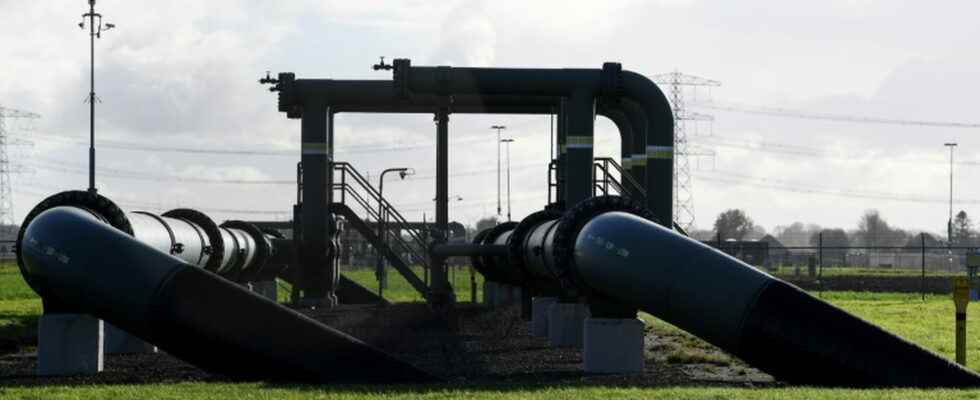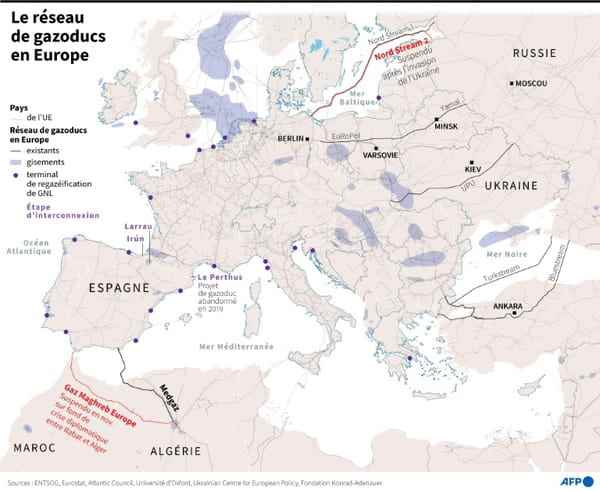EU states decided on Friday to give the European Commission a mandate to make bulk gas purchases, on the model of orders for anti-Covid vaccines, as the war in Ukraine drives up energy prices.
The Twenty-Seven and the Commission “will, urgently, work together on voluntary purchases of gas, liquefied natural gas (LNG) and hydrogen”, taking advantage of the economic weight of the EU to benefit from prices advantageous, according to the conclusions of the Brussels summit.
“Group purchasing, the ability to define long contracts together, is the best instrument to bring down prices”, argued French President Emmanuel Macron during a press conference.
“The Commission can aggregate up to 75% of gas purchases”, either by renegotiating existing contracts or concluding new ones, said Mr Macron, whose country holds the six-month EU presidency.
German Chancellor Olaf Scholz underlined that participation in the mechanism will be voluntary, unlike the joint purchasing mechanism of vaccineswhich excluded orders outside the Commission.
“We agreed on the fact that this is an opportunity that allows us to cooperate voluntarily for gas purchases,” he observed to the press.
“Of course, when you look at specific cases, it can be complicated, very complicated, because there are private companies all over Europe”, committed to contracts, “who buy gas on their behalf and intend to continue”, he explained.
Anxious to isolate Moscow and deprive Russia of sources of revenue after its invasion ofUkraineBrussels wants to reduce European purchases of Russian gas by two-thirds this year.
By grouping requests, Brussels also intends to facilitate contacts with international suppliers in order to diversify sources of supply.
The Commission is already negotiating with the main producing countries (Norway, Qatar, Algeria) and announced on Friday an agreement with the United States for them to increase their deliveries of liquefied natural gas.
The EU’s joint purchasing platform “will be open to the countries of the Western Balkans” as well as to the three states linked to the EU by association agreements (Moldova, Ukraine, Georgia), specify the conclusions.
On the other hand, the Europeans showed their divisions on the Commission’s proposals to limit the rise in energy prices.
Portugal, Spain, Italy, Greece, Belgium and France are in favor of capping and are calling for a reform of the European electricity market, where wholesale prices now depend on those of gas.
Several states (Germany, Austria, the Netherlands, Denmark, etc.) are fiercely hostile to it, preferring to count on free competition, energy efficiency measures or reinforced network interconnections on the continent.
“Germany and other countries remain very skeptical about any interventionism in the market: we risk jeopardizing our supplies without having a lasting effect on prices,” said German Chancellor Olaf after the summit. Scholz.
The European market “is complex and covers thousands of contracts, hundreds of players, with huge differences between regions”, argued his Dutch counterpart Mark Rutte.
The EU, however, agreed on Friday to grant a derogation regime to Spain and Portugal, authorized to reduce the price of gas used to produce electricity, because the two countries suffer from a lack of interconnections with the rest of the continent.
All rights of reproduction and representation reserved. © (2022) Agence France-Presse

